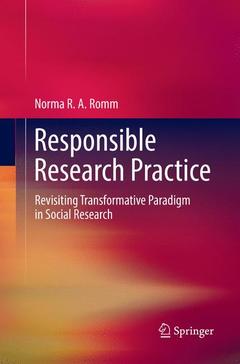Description
Responsible Research Practice, Softcover reprint of the original 1st ed. 2018
Revisiting Transformative Paradigm in Social Research
Author: Romm Norma RA
Language: English
Subjects for Responsible Research Practice:
Keywords
Active Research; Conceptualizing Creative and Active Inquiry; Creative and Active Practice of Research Ethics; Expanding Paradigmatic Positions; Relational Epistemology and Research Ethics; Responsible Approach to Methodology; Responsible Orientation to Theorizing; Revisiting Ways of Practising Mixed Methods Research; Social and Ecological Justice; Social Inquiry as Linked to Social Change; Transformative Inquiry
Publication date: 01-2019
Support: Print on demand
Publication date: 05-2018
Support: Print on demand
Description
/li>Contents
/li>Biography
/li>Comment
/li>
Explores how creative research practice can be directed to make a difference to the quality of social and ecological existence
Presents a synthesis of different strands and arguments for responsible and accountable social inquiry
Revisits transformative paradigm for social research




